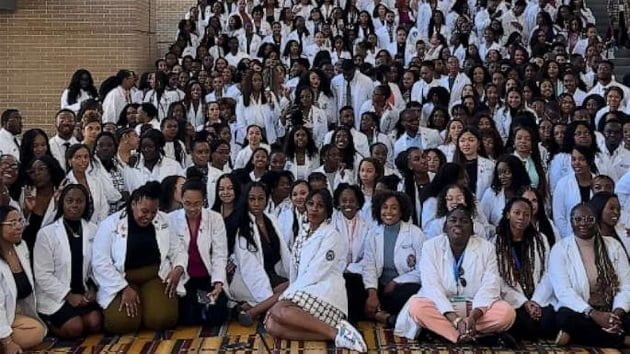(NEW YORK) — Weeks of shoulder pain landed a reluctant Whitney Nichols in urgent care. As a previously healthy 24-year-old Black woman, she pleaded for additional testing to uncover the cause of her pain. As a last resort, the doctor ordered a CT scan of her chest. The result, blood clots in both of her lungs.
Even after this seemingly scary diagnosis and after being transferred to a hospital, Nichols said she felt dismissed when a doctor told her she would be fine.
Nichols, now 29 and a graduating medical student, reflected that these interactions with dismissive doctors made her feel “so alone in that space” and unsafe.
But Nichols said that night, everything changed when a Black physician, Dr. Erika Walker, walked into the room. Walker explained the blood clots were serious but treatable. Walker advised Nichols to stop taking her estrogen-based birth control, which can increase the risk of blood clots, and prescribed medication that would break up the clots.
She said it was great ” … just seeing somebody that I felt like I could be comfortable with.”
Black people make up 13% of the U.S. population, but Black doctors are not equally represented. For example, only 7% of primary care physicians are Black, according to a study from the Journal of the American Medical Association. Amid a growing recognition that Black Americans experience disparities in health and medical care, new research suggests that Black patients are more likely to live longer and healthier lives when their primary care doctors are also Black.
Michael Dill, director of Workforce Studies at the Association of American Medical Colleges team, analyzed the relationship of Black primary care physicians and the health outcome of the people who lived in those same areas, evaluating 1,600 U.S. counties. Dill and his colleagues found that a 10% increase in Black primary care doctor representation was associated with an extra month of life expectancy for Black patients.
The higher the representation of black physicians in the workforce per county was associated less death of any cause for county residents, Black and White patients. Thus, even people not actively being treated by Black physicians benefitted from their presence like the results published in the Journal of the American Medical Association in April of 2023.
“We found that diversifying the physician workforce … is important for improving public health,” Dill told ABC News.
Dr. Bobby Mukkamala, past chair of the American Medical Association Board of Trustees, said the data was “shocking” but “in a motivational way.” Mukkamala said this data can be used to advocate for equitable hiring practices at hospitals and health care systems so that doctors and staff look like the communities they serve.
Researchers said when doctors have similar cultures and lived experiences to the patients, they may be more likely to take their concerns seriously, which results in better life expectancy.
For over 150 years ago, Historically Black Colleges and Universities (HBCU) were established to provide Black students the opportunities to advance their education when they were unwelcome at existing public and private institutions of higher education. Traditionally HBCUs are a large producer of Black physicians.
Dr. Erica Sutton, associate dean at Morehouse School of Medicine said, “feeling heard, perhaps listening as well, and then translating that into patient centered care patient driven treatment plans,” is the essence of why Black physicians can impact their patients’ health.
Dill said there is no shortcut to increasing workforce diversity. “This is not a problem we can fix in a couple of years,” Dill said. “This is the work of generations.”
Mukkamala, Sutton, and Whitney are involved in programs that aim to increase and inspire young children of diverse backgrounds to pursue careers in science, education, technology and math, including The American Medical Association’s Back to School Program, Morehouse’s health careers programs and Student National Medical Association.
“This isn’t something that you can tell somebody in college to convince them to [pursue medicine],” Mukkamala told ABC News. “Those seeds get planted early on in grade school.”
Sutton is hopeful for the future.
“I think that one of the things that we’ve seen recently in this country is a renewed interest in inclusivity belongingness … we definitely try to teach at HBCUs is that these [less diverse] communities do include you,” Sutton told ABC News. “It’s not us and them…that community is enriched by your presence.”
Danielle Craigg, MD is a senior General Preventive Medicine & Public Health Resident at Renaissance School of Medicine at Stony Brook University and a member of the ABC News Medical Unit.
Sotonye Douglas, MS is a graduating medical student from Quinnipiac University, Frank H Netter Medical School, beginning General Surgery Residency in June 2023, and a member of the ABC News Medical Unit.
Copyright © 2023, ABC Audio. All rights reserved.





